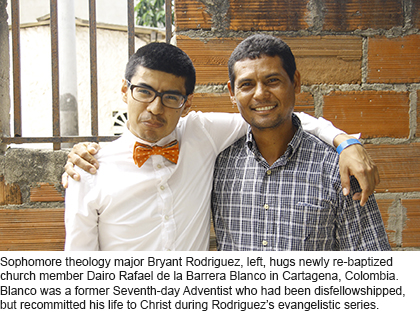Students Help Lead 1,300 to Christ through Evangelistic Meetings
This May, approximately 100 students and staff from Southern Adventist University held evangelistic meetings in Bolivia, Colombia, Costa Rica, El Salvador, and Nicaragua. Through these efforts—and considerable groundwork beforehand by the local congregations and conferences—more than 1,300 people have been baptized. All of the trips were organized by Southern’s Evangelistic Resource Center (ERC), with assistance in several of the campaigns from ShareHim and Quiet Hour Ministries.
 Carlos Martin, professor in the School of Religion, led a group of 20 students to
Bolivia and partook in what he referred to as "pure, old-fashion evangelism." The
multi-ethnic group from Southern represented 13 nationalities, a quality Martin saw
as attractive to their audience.
Carlos Martin, professor in the School of Religion, led a group of 20 students to
Bolivia and partook in what he referred to as "pure, old-fashion evangelism." The
multi-ethnic group from Southern represented 13 nationalities, a quality Martin saw
as attractive to their audience.
"We seemed to represent the cultural diversity of the world church, and I think people appreciated that," Martin said.
Freddy Fuentes, associate professor for the School of Education, Psychology, and Counseling, traveled with 13 students to El Salvador, seeking to bring the message of Christ's love to a country deep in political turmoil. Their government is suspected of being connected with MS-13, one of the most violent gangs in the world that has branches in large cities throughout the Americas. Despite this, the group had 174 baptisms.
"Gang members kind of hung around at first, perched outside like pigeons on a fence,” Fuentes said. “But as they listened to the sermons they invited their friends to join them at the meetings, and they gave their hearts to Christ!"
Blessed by Serving
These mission trips not only had a powerful influence on the people in the countries
visited, but also on the students who devoted their time to sharing God's word. Student
preachers return to the United States with a better understanding of the biblical
doctrines and increased confidence in their ability to witness.
“Some students were brought into the church as child members, without full instruction before baptism,” Martin said. “But for these meetings they had to study and explain the doctrines to others. Many will go on to become lawyers, architects, and surgeons who already know how to preach doctrines. Southern is preparing church leaders for today and for the future.”
Chris Janetzko, senior mass communications major, turned to social media to seek the prayers and encouragement of friends and family while he was preaching in Colombia. This was especially true while working on his sermon about the 2,300-day prophecy, a topic about which he didn’t feel particularly confident in his ability to share. When the presentation was finished, Janetzko’s faith was affirmed through the experience and he took to Facebook as means to express his excitement.
“The Spirit lead tonight! Who ever doubted He would?”
Though the bulk of work done by students involved preaching evangelistic sermons, they also served as the hands of feet of Jesus by working in medical clinics, children's ministries, and in construction. This was especially true in Costa Rica.
Supporting Students
The ERC has an ambitious vision for the role of Southern students and the university
in helping prepare the way for Jesus’ second coming. The five trips in May, and one
underway in Chile at the time of this article’s writing, require considerable financial
and human resources. Thus summer’s outreach cost approximately $330,000, with expenses
being split between the university, the Southern Union and local conferences, and
the students who are participating.
Some of the students have yet to reach their fundraising goals. Readers impressed to support this important work may visit southern.edu/give and select “Summer Evangelism Abroad” from the “Gift” dropdown menu.